#inge scholl
Text
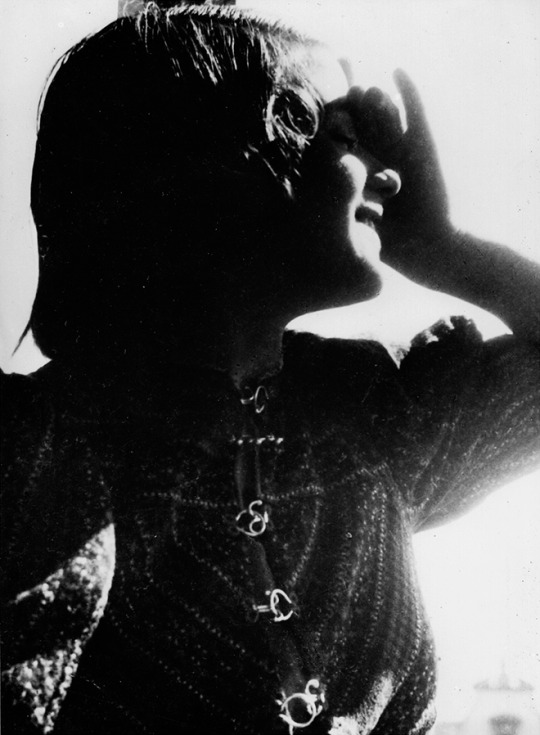
München, February 22, 1943 / 2024
«Einer muss doch schließlich mal damit anfangen. Was wir sagten und schrieben, denken ja so viele. Nur wagen sie es nicht, es auszusprechen.» – Sophie Scholl, Justizpalastes, München, February 22, 1943
«Die Verurteilte war ruhig und gefasst.»
(Protokoll über die Vollstreckung des Todesurteils des Volksgerichtshofes an Sophie Scholl, München, den 22. Februar 1943)
«freiheit»
(the reverse side (detail) of a document belonging to the Chief Prosecutors, February 21, 1943, with handwriting «freedom» by Sophie Scholl)
Sophie Scholl (May 9, 1921 – February 22, 1943), student
Hans Scholl (September 22, 1918 – February 22, 1943), student
Christoph Probst (November 6, 1919 – February 22, 1943), student
Alexander Schmorell (September 16, 1917 – July 13, 1943), student
Kurt Huber (October 24, 1893 – July 13, 1943), professor
Willi Graf (January 2, 1918 – October 12, 1943), student
and
Hans Konrad Leipelt (July 18, 1921 – January 29, 1945), student
Margaretha Rothe (June 13, 1919 – April 15, 1945), student
Reinhold Meyer (July 18, 1920 – November 12, 1944), student
Friedrich Geussenhainer (April 24, 1912 – April 1945), student
Katharina Leipelt (May 28, 1893 – January 9, 1944), dr. rer. nat.
Elisabeth Lange (July 7, 1900 – January 28, 1944)
Margaretha Mrosek (December 25, 1902 – April 24, 1945)
Kurt Ledien (June 5, 1893 – April 23, 1945), dr. jur.
«Das wird Wellen schlagen»
«Allen!»
(image: Sophie Scholl, ca. early-1940s, in Christine Hikel, Sophies Schwester. Inge Scholl und die Weiße Rose, Oldenbourg Verlag, München, 2013, p. 94)
#weiße rose#sophie scholl#hans scholl#christoph probst#alexander schmorell#kurt huber#willi graf#hans konrad leipelt#margaretha rothe#reinhold meyer#friedrich geussenhainer#katharina leipelt#katharina leipelt baron#elisabeth lange#margaretha mrosek#margaretha mrosek schram#kurt ledien#christine hikel#inge scholl#weiße rose stiftung#oldenbourg verlag#studentenwohnheim geschwister scholl#1890s#1900s#1910s#1920s#1940s
21 notes
·
View notes
Photo

#Thursday July 28#freeaudiobooks#SYNC#David Safier#28 days#Inge Scholl#The White Rose#teens#summer2022#SGCL
2 notes
·
View notes
Text
[Free eBooks] 28 Days: A Novel of Resistance in the Warsaw Ghetto by David Safier & The White Rose: Munich 1942-1943 by Inge Scholl [Award-Winning YA WWII Historical Fiction & History]
The annual SYNC Summer of Listening program continues, promoting literacy among teens by giving away YA-friendly weekly paired audiobooks—1 modern, 1 classic/drama performance—free for a limited time courtesy of the the participating publishers and sponsor AudioFile Magazine.
This 14th week's featured selections, free through Wednesday August 3rd, have a theme of “Resistance”, focusing on fiction and non-fiction about individuals of varying backgrounds caught up in World War II, in groups targeted for different reasons:
28 Days: A Novel of Resistance in the Warsaw Ghetto by award-winning German author David Safier, translated by Helen McCormac and read by Amanda Dolan from Recorded Books. This is a YA historical novel centred around the everyday life of a Jewish teenager as she tries to survive the Warsaw Ghetto. The novel won the Buxtehude Bull award for youth literature, and is dedicated to the author's grandparents who were also forced to experience life in a wartime ghetto.
The White Rose: Munich 1942-1943 by the late German activist Inge Scholl, translated by Arthur R. Schultz with an introduction by the late German theologian Dorothee Sölle, and read by Elizabeth Wiley, Heather Henderson, and a supporting cast from Post Hypnotic Press. This is her vintage 1952 history/memoir of the White Rose resistance group of German university students protesting the Nazi regime, of which her younger brother and sister were key members, leading to the family's arrest. A full cast provides additional narration to excerpts from period leaflets and postwar commentary, as well as the words of the young protestors.
The freebies are claimed via the Overdrive Sora app for iOS & Android or directly via the Sora website. You'll need to register just once with a valid email address and the signup code provided via the front page of the promotion and follow the instructions on the FAQ page to “Borrow” each week's featured selections for a permanent loan you can listen to anytime via online streaming on all devices or download for just the apps. NB: if you need to free up space on your device later, be sure to follow the FAQ instructions to ONLY delete the downloaded files and NOT “Return” which would remove your future access.
Offered free worldwide through Wednesday August 3rd (until just before midnight Eastern Time), available directly from the Sora website and apps, and you can sneak peek the upcoming featured selections to see if there's anything you'd be particularly interested in.
#free audiobooks#david safier#inge scholl#young adult#history#historical fiction#world war ii#white rose#warsaw ghetto#fiction in translation#memoir
0 notes
Text
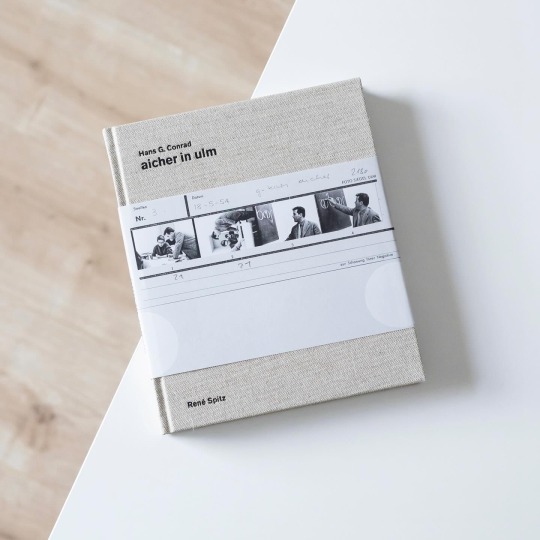

The Hochschule für Gestaltung in Ulm, Germany’s trailblazing postwar design school, and the name of Otl Aicher are inseparably connected: together with his wife Inge Aicher-Scholl and Max Bill he founded the school and had a decisive influence on it, both as teacher and rector. Aicher was a stubborn and belligerent character, a trait that eventually sealed the fate of the school: dissatisfied with the direction of the school and the growing scientification of the curriculum Aicher aired his grievances on different occasions. Especially before and after his election as rector in 1962 Aicher in two programmatic texts laid out his criticism, two texts that are also included in René Spitz’s new book „Hans G. Conrad - Otl Aicher in Ulm“, recently published by Verlag der Buchhandlung Walther und Franz König. As the author explains, these texts follow up on a development of polarization within the faculty and between practicalists like Aicher and scientists/theorists like mathematician Horst Rittel. This conflict surely also relates to Aicher’s understanding of the HfG as „his“ school and the strong position he held within it and whose ouster of the scientist eventually initiated the school’s closing. This former aspect of his work comes to life in Hans G. Conrad’s photographs taken between 1953 and 1957: as „student no. 1“ Conrad documented the early years of the HfG and the central role Aicher played in it, both inside and outside the classroom: Aicher with friends and colleagues, Aicher with dignitaries like Theodor Heuss or Aicher as gesticulating teacher, all of the photos demonstrate the taking nature of Otl Aicher and convey a sense of why he was such a charming primus inter pares. At the same time Conrad also documented his own projects in the Aicher seminars, beautiful works in their own right that complete the picture of Otl Aicher’s activities.
The second volume of Hans G. Conrad’s photographs of prominent protagonists at the HfG in Ulm is a historic treasure that not only shows Otl Aicher in action but also documents the school’s formative years in impressive pictures. A beautiful book and an fascinating addition to the history of a legendary school!
33 notes
·
View notes
Photo


SYNC Audiobooks for the week of July 28 - August 3:
28 Days by David Safier. In Warsaw, Poland, in 1942, Mira faces impossible decisions after learning that the Warsaw ghetto is to be "liquidated," but a group of young people are planning an uprising against their Nazi captors.
The White Rose by Inge Scholl. The story of Hans Scholl and Sophie Scholl, who in 1942 led a small underground organization of German students and professors to oppose the atrocities committed by Hitler and the Nazi Party. They named their group the White Rose, and they distributed leaflets denouncing the Nazi regime.
SYNC is a free summer audiobook program for teens 13+.
Access Details:
Titles are accessible in Sora, the student reading app from OverDrive.
Sora is available in your browser at soraapp.com, or as an app from the Apple App Store or Google Play.
Each SYNC audiobook will be featured in Sora for a window of 7 days.
Titles are yours indefinitely once you “borrow” them during their 7-day availability window in Sora.
8 notes
·
View notes
Text
┍━☽【❖】☾━┑
IRON SKY
┕━☽【❖】☾━┙
╰┈➤ ORIGINAL WORK
a researched ww1 and ww2 project about a german officer defecting from his country after becoming disenfranchised with existence following his survival in the Great War. This will have a heavy emphasis on organizations such as the White Rose, and other lesser known factions of German Resistance.
- ̥۪͙۪˚┊❛ CONTENT WARNINGS ❜┊˚ ̥۪-
trauma, ptsd, occasional german, adult themes, violence, historical issues, heavy emphasis on self sabotage as a way of penance
════ ⋆★⋆ ════
he thought there had been something worthwhile. that there was glory in war. they had all been foolish. now he was a husk of who he'd once been -- he lost everything and now? he must end it before it consumes him. The cost of treason is death, and yet for him, it is not nearly merciful enough for what his country has done. it all must burn.
════ ⋆★⋆ ════
books used:
the lair - erik larson
the white rose - inge scholl
the last battle - cornelius ryan
soldat - reflections of a german soldier - siegfried knappe
librarian of auschwitz - antonio iturbe
i will bear witness - victor klemperer
════ ⋆★⋆ ════
current planned chapters
prologue. chapter one. chapter two. chapter three. chapter four. chapter five. chapter six. chapter seven. chapter eight. chapter nine. chapter ten. chapter eleven. chapter twelve. chapter thirteen. chapter fourteen. chapter fifteen. chapter sixteen. chapter seventeen. chapter eighteen. chapter nineteen. chapter twenty.
1 note
·
View note
Text
Introducción al personaje
Ich habe am 9 Mai 1921 in Forchtenberg geboren. Ich habe am 1932 Sekundarschulbildung in einer Schule für Mädchen studiert. Ich habe am 1942 Biologie und Philosophie an der Universität München studiert. Ich habe 5 Geschwister, Ihre Namen sind Hans Scholl, Elisabeth Hartnagel, Inge Aicher-Scholl, Mathilde Scholl und Werner Scholl.
1 note
·
View note
Text
Celebrate National Girl Child Day by making the lives of girls better

National Girl Child day is celebrated on January 24th every year. Since 2008, this day has been celebrated with only one purpose in its mind, to raise awareness about the plight of the girl child in India. The day was introduced by the ministry of women and child development. The government has made continuous efforts to improve the state of girls in our country. National campaigns like ‘Beti Bachao, Beti Padhao’, subsidised education for girls, reservations for girls in universities, and colleges, have been introduced to reduce the disparity against women.
While India has made tremendous strides in improving the lives of girls in the country, the statistics reveal a heart-breaking and depressing reality. In contrast to the male literacy rate of 82.14, the female literacy rate stood at a measly 65.46. According to the annual bulletin of the The sexual harassment rate went from 28.9% to 33.6%, 3.7 % of girls were married below the age of 18 in 2011, and over 2,000 girls are illegally aborted every day in India. The male employment rate is 56.8, while the female employment rate is only 22.2. This shows
that despite the constant efforts of feminist movements, the girl child in India is far from empowered and independent.
Even horrific crimes against girls rose up. The sexual harassment rate went from 28.9% to 33.6%. 3.7 % of girls were married below the age of 18 in 2011, and over 2,000 girls are illegally aborted every day in India.
So what can you do to raise awareness about the miserable situation of girls in India on National Girl Child Day?
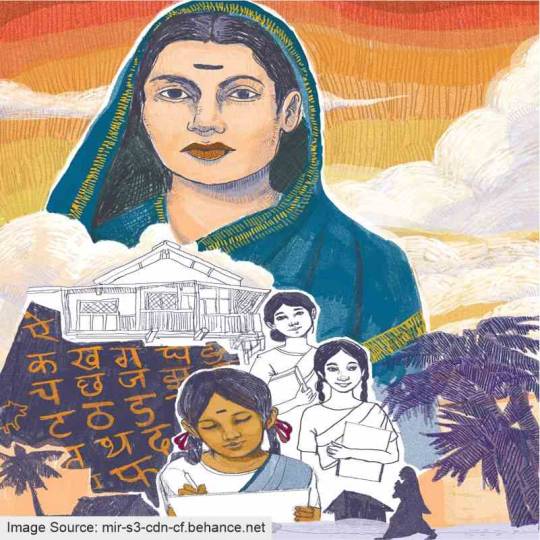
At the grassroots level, you can share inspiring stories of female changemakers in diverse fields on social media. Never underestimate the power of your voice, as a single share can spark an immediate chain reaction. Spreading stories about historical figures like Rani Laxmibai, Savitribai Phule, Rosa Parks, Amelia Earhart etc. Modern female leaders like New Zealand’s Jacinda Ardern, Finland’s Sanaa Marin, Germany’s Angela Merkel, Denmark’s Mette Frederiksen, and Taiwan’s Tsai Ing-Wen, proved to be more apt to handling the pandemic than major world powers. Such tales can be shared to boost the morale of girls.
The events of the day should not be limited to girls. You can make boys aware of menstrual hygiene and health, teach them about appropriate behaviour towards the female sex, and make them aware of ‘good touch’ and ‘bad touch’. Boys should be taught that their female peers, are not inferior to them in any way, and should be instructed to stand up for girls around them.
In your institutes, you can screen films which have feministic narratives like Emerald Fennell’s Promising Young Women, Marc Rothemund’s Sophie Scholl- The Final Days, Bo Burnham’s Eighth Grade, Aniruddha Roy’s Pink, Jasmeet Reen’s Darlings. Examples of powerful female fictional characters like Wonder Woman, and The Bride, can also be shared with young children.
You can also donate money to NGOs that actively work to improve the lives of girls. NGOs like Aarti for Girls, Nanhi Kali, Big at Heart etc, are some of the many NGOs working in India.
So, on 24th January, let’s take an oath to improve the lives of female children in India.
Source - https://childhelpfoundation.in/blog/posts/Celebrate-National-Girl-Child-Day-by-making-the-lives-of-girls-better
0 notes
Text
Indie Comic Review: Freiheit!: The White Rose Graphic Novel
If you haven't done so yet, go check out Freiheit!: The White Rose Graphic Novel by Andrea Grosso Ciponte. It's brilliant!
Here is our review by the incredibly talented @DevourAllWords
@plough #Freiheit #TheWhiteRose #DCComicsNews
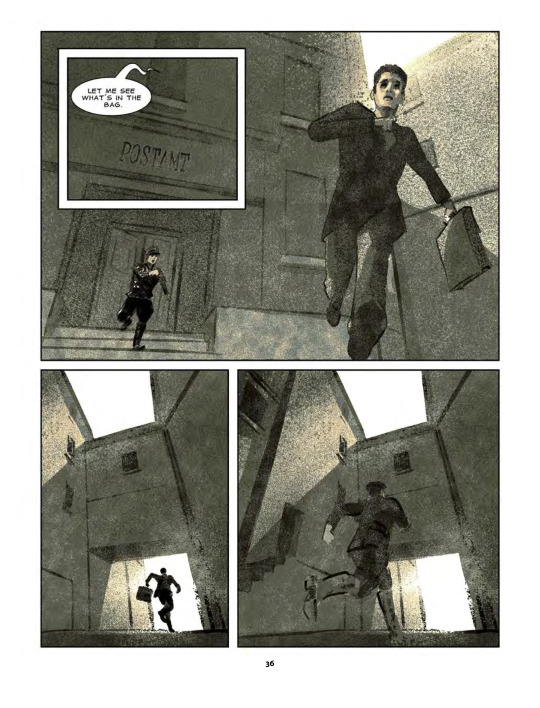
View On WordPress
#Alex Schmorell#Andrea Grosso Ciponte#Christoph Probst#DC comics news#Freiheit!: The White Rose Graphic Novel#Hans Scholl#Inge Scholl#Kendra Hale#Kurt Huber#review#Sophie Scholl#The White Rose#Willi Graf#WWII
10 notes
·
View notes
Text

Inge Scholl - La Rose Blanche (Six Allemands contre le nazisme)
#inge scholl#sophie scholl#german resistance#resistance allemande#la rose blanche#die white rose#die weisse rose#citation#m#t
10 notes
·
View notes
Text
Sophie Scholl
Sophie Scholl. Heute vor 100 Jahren wurde sie geboren. #sophiescholl100
Heute vor 100 Jahren wurde Sophie Scholl geboren. Zum einhundertsten Geburtstag von Sophie Scholl erscheint eine 20-Euro-Sammlermünze aus Silber. Erstaunlich, was das Finanzministerium im Bild eines pummeligen Mädchens im Kleid mit Rüschenkragen und herabhängenden Haarsträhnen erblickt: „Die Bildseite zeigt ein Porträt von Sophie Scholl, das ihre besondere Persönlichkeit sichtbar macht. Die…
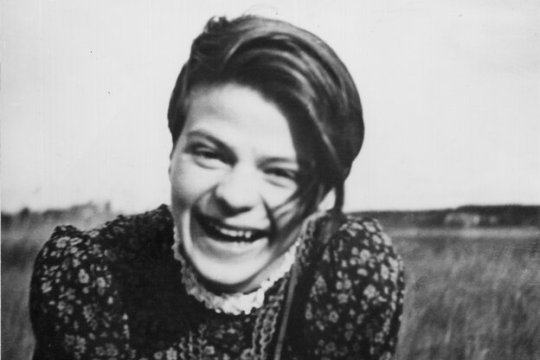
View On WordPress
#Hans Scholl#Inge Scholl#Ricarda Huch#Sammlermünze#Sophie Scholl#Weiße Rose#Widerstand#Widerstandskämpfer
0 notes
Text
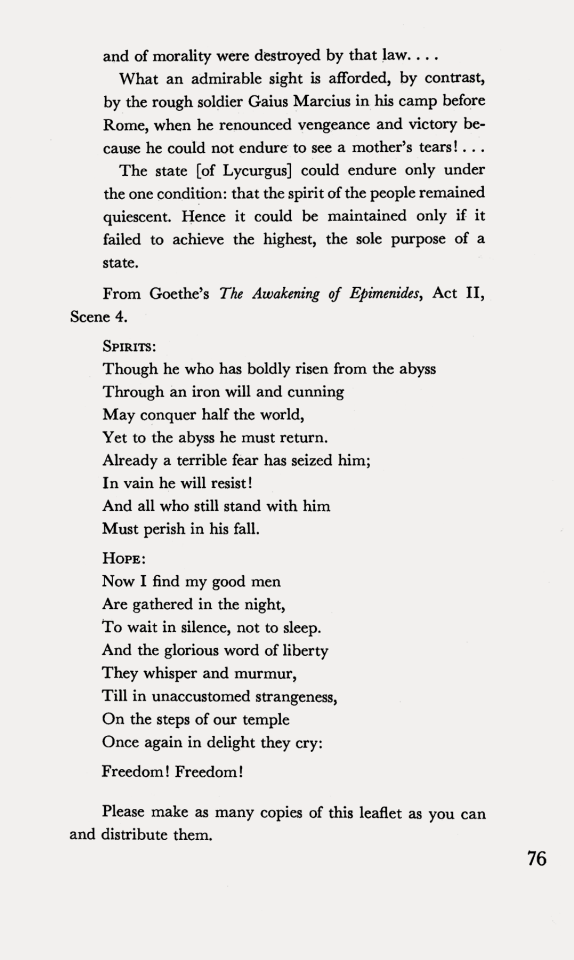
Johann Wolfgang Goethe, (1815), Des Epimenides Erwachen (Zweiter Aufzug, Vierter Auftritt) [The Awakening of Epimenides, Act II, Scene 4], quoted in Weiße Rose, Leaflet #1 [Summer 1942]
SPIRITS:
Though he who has boldly risen from the abyss
Through an iron will and cunning
May conquer half the world,
Yet to the abyss he must return.
Already a terrible fear has seized him;
In vain he will resist!
And all who still stand with him
Must perish in his fall.
HOPE:
Now I find my good men
Are gathered in the night,
To wait in silence, not to sleep.
And the glorious word of liberty
They whisper and murmur,
Till in unaccustomed strangeness,
On the steps of our temple
Once again in delight they cry:
Freedom! Freedom!
From: Inge Scholl, (1952), The White Rose. Munich 1942-1943, With an Introduction by Dorothee Sölle, Translated from the German by Arthur R. Schultz, Wesleyan University Press, Middletown, CT, 1983, p. 76
#graphic design#poetry#theatre#theater#book#johann wolfgang goethe#weiße rose#sophie scholl#inge scholl#else gebel#dorothee sölle#arthur r. schultz#wesleyan university press#1810s#1940s#1950s#1980s
13 notes
·
View notes
Photo
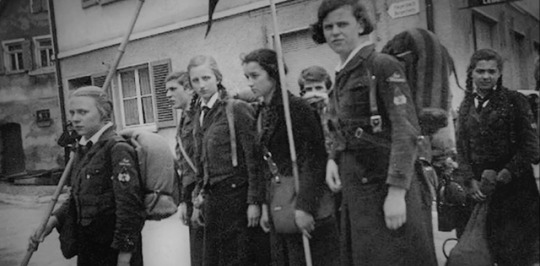
Inge Scholl, in the BDM, 1935.
16 notes
·
View notes
Text
Ein Offener Brief an Ver.di Berlin wegen Ver.dis feindseliger Haltung zu Demos
Ein Offener Brief an Ver.di Berlin wegen Ver.dis feindseliger Haltung zu Demos
Die Sonderpädagogin Magda von Garrel hat einen Offenen Brief an Ver.di geschrieben. Wir machen darauf aufmerksam und veröffentlichen diesen Brief (Teil A), weil es langsam unerträglich wird, mit welcher Selbstverständlichkeit sich Einrichtungen und Organisationen, die eigentlich anderes zu tun haben, gegen Menschen positionieren, die ihr demokratisches Recht wahrnehmen zu demonstrieren. In Teil B…

View On WordPress
#Christian von Lerchenfeld#Frank Wolf#Frische Sicht#Inge Aicher-Scholl#Julian Aicher#Magda von Garrell#NachDenkSeiten#Thomas Stimmel#ver.de Landesbezirk Berlin-Brandenburg#Weiß Rose
0 notes
Text
From @valiantarcher: 1-5, 7, 9, 29, and 30, please? (cont'd)
A book you love that it seems like no one else has read.
I am going to briefly highlight three whilst I have the opportunity.
The Man From Rocca Sicca by Reginald M. Coffey, O.P., is a slim out-of-print biography of St. Thomas Aquinas. Like many a liberal arts student, I tended to think of Thomas Aquinas as a book rather than a man. This book changed all that for me, offering a picture of a man so vibrantly in love with Christ and His Cross, with a distinct and wonderful personality, for whom theological scholarship was charged with all the passion of a first love, the banner of academic orthodoxy and fidelity to Scripture as robust and red as the banner of a triumphant army's banner.
Three Religious Rebels by M. Raymond is a set of historical novellas about the fore-founders of the Trappist movement to reform the Benedictine Order. The first one, about St. Robert, is especially great. I have never forgotten the line "to do something gallant for God."
On a less spiritual note, let me note that while for some reason Rudyard Kipling's works don't tend to click for me, I have a deep-rooted love of his Stalky and Co (get the "complete" edition if you can.) These rollicking tales were inspired by his own school days, about the most outrageous kings of mischief you can get up to in a British public school. They burst with both affection and hatred for late Victorian military schools. The amount of culture-based in-jokes is and delightful and mind-boggling, much like one finds in the Wimsey books. These stories are some of the most quotable works on earth, and Mr. King, the Latin master, deserves to be remembered among literature's great characters - his assertion "it sticks" has often encouraged me as a teacher.
A book that left you feeling overwhelmed with happiness.
The Man Born to Be King by Dorothy L. Sayers. This cycle of twelve plays on the life of Christ was insightful, reverent, but most of all, such an ode to the humanity of Christ. She knew how to show him, as down-to-earth and real as fresh-baked bread that needs no butter, it's so good and hot, but without any need to downplay his divinity to do it. She realizes, unlike so many authors, that there is no need to "humanize" Jesus, for He is human. The characterization of each of the apostles is great. The joy and understanding, the wit and sacredness of these plays is amazing, and fanned my desire for scripture while loving it as a literary work in itself.
A book that you found yourself thinking about a long time after you finished it.
The White Rose by Inge Scholl was recommended to me by a trusted professor. It was my introduction to the Munich student resistance and their infamous pamphlets calling upon their fellow citizens to rise up on behalf of the true Germany, rejecting the false Germany Hitler had stained over it as a veneer. Inge was the younger sister of Sophie and Hans, university students who, along with several others, established a basement hideout from which to print and prepare their pamphlets for mass dispersal. They were caught while attempting to secretly leave piles of pamphlets in the university corridors while no one was about, and were executed after a few days' interrogation. Their heroism, in death and life, resounded with me on so many levels - spiritual, political, passionate. Inge's account is especially poignant, because while she strives for impartiality she was still a little girl at the time these events took place, and she never knew what he her siblings had become involved in until their final days. To read the six pamphlets themselves one must do some honest self-examination in their light. The story this book introduced me to stayed with me so long I ended up writing and directing a play about the White Rose in the following years, and incorporating the story and pamphlets into at least two curricula. One of my actors still texts or emails me on the day of the execution to remind me of it, even after all this time.
An author you recently discovered and would like to read more of.
I must admit I haven't done much in the way of discovering new authors lately. Other than Katherine Addison (whose other books don't look like something I plan on reading,) I've mainly been exploring or rereading authors with whom I am already familiar lately. Shakespeare, the Pentateuch, Homer, Austen, Tolkien, Sanderson, Beagle. I suppose I did just begin The Thief - the world and its dog have recommended the series to me for years, but I'm not far enough in to call myself properly invested. Oh, Andrew Peterson, possibly?
A fictional book that taught you about/increased your interest in a real-life subject.
George Bernard Shaw's gem of a one-act play, "The Man of Destiny," kickstarted my fascination with Napoleon Bonaparte. The play concerns him before his rise to power, as a young general who ran before cannons to secure the victory. It's about an encounter he has at an inn with a lady known only as "the strange woman" who has stolen his military dispatches, and the cat-and-mouse game of wits they play for who shall walk away with the letters. As usual, Shaw is tremendously wordy in his commentary, even during the play itself, enough to ignite me on a true kick of learning about the real life Napoleon.
Thank you so much for the ask! The original ask post is here. My asks aren't working, but if you'd like to ask, feel free to tag me in a comment!
#Coreander's Old Books#recs#books#ask game#the man from rocca sicca#three religious rebels#stalky and co.#rudyard kipling#dorothy l. sayers#the man born to be king#george bernard shaw#the man of destiny
2 notes
·
View notes
Photo

Hochschule für Gestaltung Ulm, Inge Aicher-Scholl, Otl Aicher, Max Bill, 1953-55
278 notes
·
View notes